There was a time when long range shooting was more art than it was science. It took skill and experience to judge the range, estimate wind speed, and understand how the conditions would affect the bullet’s flight path. One brand that has been consistently at the forefront of advancing long range shooting technology is Kestrel, best known for their handheld weather meters. Kestrel weather meters are ubiquitous on the firing line at many matches and have become the gold standard by which every other weather meter is judged. Recently I set my data cards down and I brought myself into the 21st century by getting a Kestrel 5700 Elite w/ LiNK. The 5700 Elite raises the bar over anything else I’ve found on the market by providing a world-class weather meter combined with an integrated ballistic computer good for any caliber with a maximum range measured in miles.
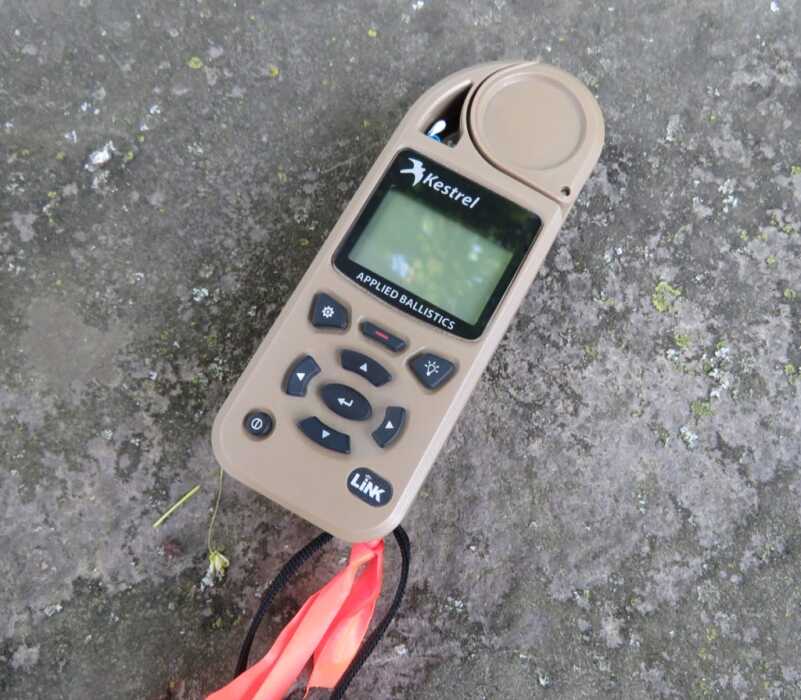
The Kestrel 5700 Elite w/ LiNK doesn’t look that much different from the previous generation of Kestrel weather meters but the new model features enhanced screen resolution, a superb ballistics solver, and an intuitive interface.
Out With The Old, In With The New
Although the 5700 Elite w/ LiNK replaced the 4500 AB (Applied Ballistics), at its heart the Elite model is the same tried and true weather meter that many of us know and love. It will still provide accurate readings for things like wind speed, wind direction, temperature, humidity, altitude, density altitude, and a host of other atmospheric conditions. Just like in the previous Kestrel models you can turn off which measurements you don’t want shown and set up user screens for key data that you might need right away.
The new Kestrel meters have also made some improvements that help with not only the user-friendliness but overall survivability too. For starters, the Kestrel 5700 uses a single AA battery as opposed to two AAA batteries that powered the previous generation and the battery door is now in the back of the unit. If the battery leaks, the compartment is sealed off from the circuit board and the acid won’t destroy the unit.

The battery hatch on the back of the unit makes changing out the battery easier but also makes the unit safe from battery leakage. In the event a battery should catastrophically end its life, the acid won’t destroy the circuit board.
Those familiar with the old models may also notice the slightly larger screen however they’re more apt to notice the enhanced screen resolution. It’s now much easier to read compared to the older units, which were more akin to a mid-2000’s cell phone screens. The screen’s backlighting has also been updated so there’s a choice between the standard white or a more night vision-friendly red setting when you need to be more covert. At 5.0″ X 1.9″ X 1.1″ the new Kestrel’s are just a little different dimensionally than its predecessors, mainly due to the revised battery compartment, however, it should fit the same storage pouches.
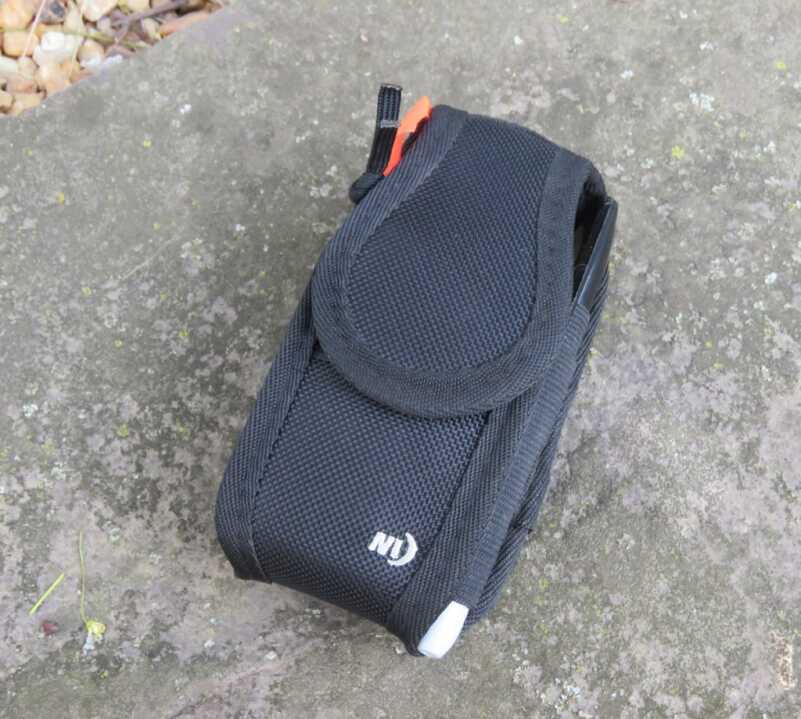
Although the Kestrel is slightly larger than the older models at 5.0″ X 1.9″ X 1.1″ it will still fit the same storage pouches. Fun fact, this $10 Nite Ize phone pouch fits the Kestrel 5700 perfectly to keep it accessible while still keeping it protected from bumps.
| FEATURES: | |||||||
| 1. AB Ballistic Engine | 15. Moving Target | ||||||
| 2. Easy Mode | 16. Range Estimation | ||||||
| 3. Custom Drag Model Library | 17. Inclination | ||||||
| 4. G1/G7 BC | 18. Range Card | ||||||
| 5. Bluetooth | 19. Multi-Target Function | ||||||
| 6. 30 Guns –The Elite Model can store up to 30 guns. | 20. Multiple Saved Targets | ||||||
| 7. Multi Color Backlight. | 21. Ballistics Data | ||||||
| 8. Ballistic Calibration Feature | 22. Density Altitude | ||||||
| 9. Muzzle Velocity Calibration Walk through. | 23. GPS From Device | ||||||
| 10. Muzzle Velocity Calibration Feature | 24. Multiple Readings | ||||||
| 11. Muzzle Velocity Temp-Table | 25. Data Logging 26. Replaceable Impeller | ||||||
| 12. Coriolis Effect | 27. Multiple Languages. | ||||||
| 13. Spin Drift | 28. Metric Support. | ||||||
| 14. Aerodynamic Jump | 29. Mil Spec – Mil-Std 810g Drop Tested + IP67 Waterproof. | ||||||
| READINGS: | |||||||
| 1. Temperature | 9. Density Altitude | ||||||
| 2. Wind Speed | 10. Wind Chill | ||||||
| 3. Wind Direction | 11. Heat Stress Index | ||||||
| 4. Crosswind (Degrees or Clock Value) | 12. Dew Point Temp | ||||||
| 5. Headwind/Tailwind | 13. Wet Bulb Temp | ||||||
| 6. Relative Humidity | 14. Compass Direction | ||||||
| 7. Barometric Pressure | 15. Altitude | ||||||
| 8. Station Pressure | 16. Pressure Trends | ||||||
| Dimensions: | 5.0″ X 1.9″ X 1.1″ | ||||||
| Weight: | 4.3 oz. | ||||||
| MSRP: | $699 | ||||||
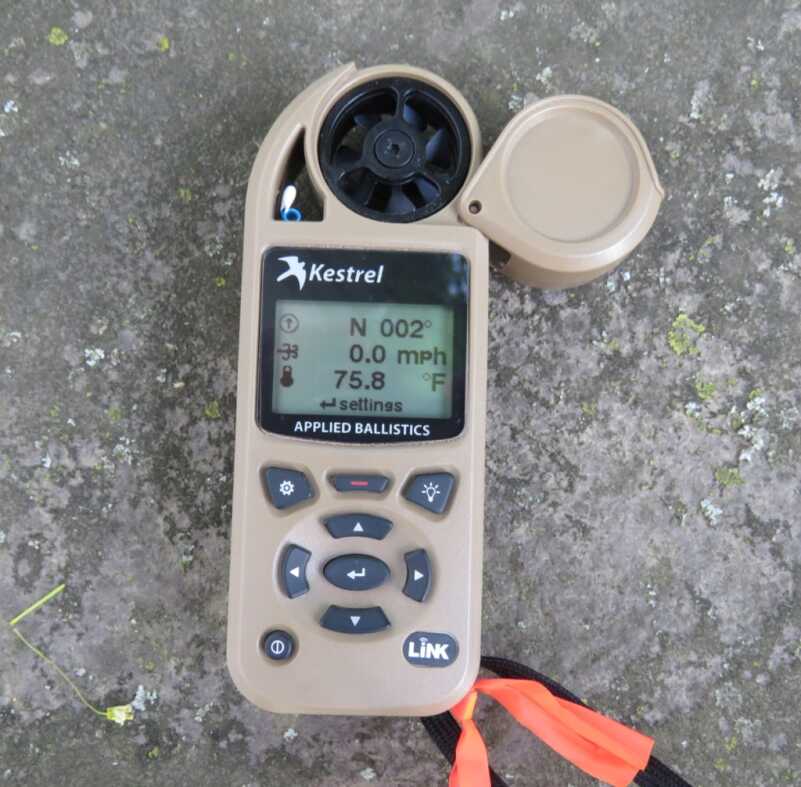
One of the features on the Weather side of the Kestrel are customizable user screens that allow you to see three measurements at one time. Here I’m displaying the compass heading, wind speed, and temperature.
Awesomeness Inside
The “elite” part of the Kestrel 5700 Elite comes from the integration of an Applied Ballistics solver that’s fed current weather data from the meter so that the ballistics are as accurate as possible. I received my Kestrel back in the Winter and as most things go with electronics the firmware needed an update before Spring. Kestrel actually makes the update process pretty painless, especially with the LiNK (Bluetooth) connectivity to compatible devices like Android or iOS smartphones. All it required was downloading a free app and once the two were connected the app automatically prompted me to begin the download, which took less than thirty minutes.
So what changes did the firmware update make? Well, I can have 30 distinct gun profiles, an increase from 16 when it was first released, to which I can set each profile up to a different gun. The maximum range has also been extended from 4,000 yards to 5,500 yards, which is just a shade over three miles. The firmware update also increased the number of individual targets that data could be entered in for from five to ten targets. This doesn’t seem significant but there are occasions when more than five targets need to get shot so being able to have individualized data for each is appreciated. A new Easy mode was added to provide simple elevation and wind information for a selected gun and not much more than that. I’ve used this feature at the range and at matches when there’s a single known distance target and scrolling through multiple screens for the target set up isn’t necessary. As with any ballistic solver, it takes some front end work to enter in the information for each profile so that the solver has something to work with and the expansive bullet library helps with that too. Did I mention that the Applied Ballistics firmware will also give you data in four languages? English, French, German, and Spanish.
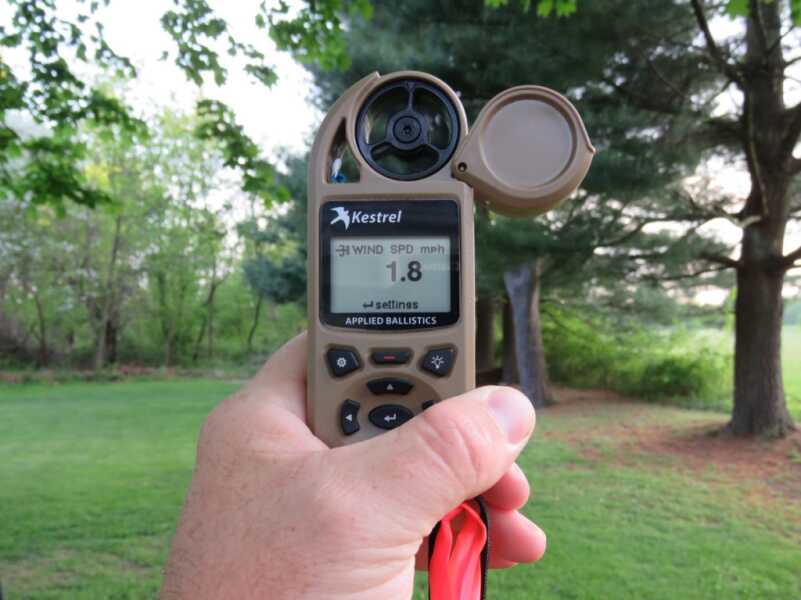
The anemometer is sensitive enough to pick up wind speeds you’d barely be able to feel on your face.
Sending Lead Down Range
I’ve been using this 5700 Elite for a little while and I still don’t think I’ve used half of its features but so far I can say am I very impressed with this technology. The first time I really got to use my new Kestrel was at a PRS Club match where it helped provide solid hits with my 6.5 Creedmoor shooting factory Winchester Match ammo from 300 yards out to 1,070 yards. The ability to use the Kestrel to quickly create customized ballistic cards for each target on a stage based on the current conditions was amazing. A short time later I was back at Peacemaker to shoot in the annual DMR Challenge, using my AR-15 in a field crowded with large frame AR’s to negotiate 20 challenging stages with only my Kestrel 5700 to provide dope. Despite being at a slight disadvantage by shooting factory IMI 77 gr Razor Core out to ranges beyond 700 yards against 6.5 calibers in various flavors I managed a 12th place finish overall. The Kestrel’s data was perfect and the fact that I dropped 13 out of the 141 targets was due to my own errors in rushing bad shots or not executing the stage as I should have.
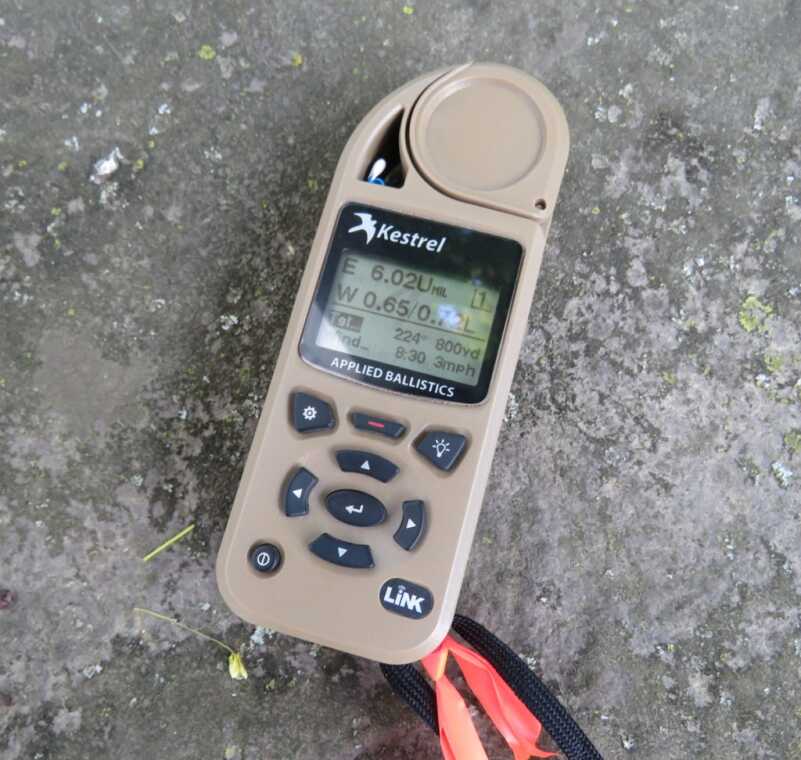
On the Ballistics side of the Kestrel the main screen will show you the elevation setting for the distance entered in, target direction, and wind speed. The wind speed can be taken from a live capture or entered in as a low and high value if you are shooting in gusting winds.
I think the best testament to the capabilities of the Kestrel 5700 Elite were on display at a recent range trip where I was getting my modified Ruger 10/22 ready for an upcoming precision rimfire match. I had made the decision to use Eley Force ammunition so I was at the range to get the scope zeroed and then collect some data out to 300 yards. I started out a sort of hodgepodge of information, using an unconfirmed BC that I’d heard from a friend along with a muzzle velocity that another friend had gotten with the same ammo. It wasn’t the best starting point but I created a new profile using this assortment of data and entered in target distances for 200 and 300 yards. Imagine the smile on my face then when I got hits at both distances with the elevation setting only being 0.2 mils off at the farthest target. It’s impressive that the technology allowed me to only be 0.2 mils off with .22LR ammunition at 300 yards, which is only about two inches, all the while starting out with imperfect data. If that’s not an exquisite demonstration of the versatility of this technology, to be able to toggle between such diverse calibers and get accurate data to long distances, I don’t know what is.
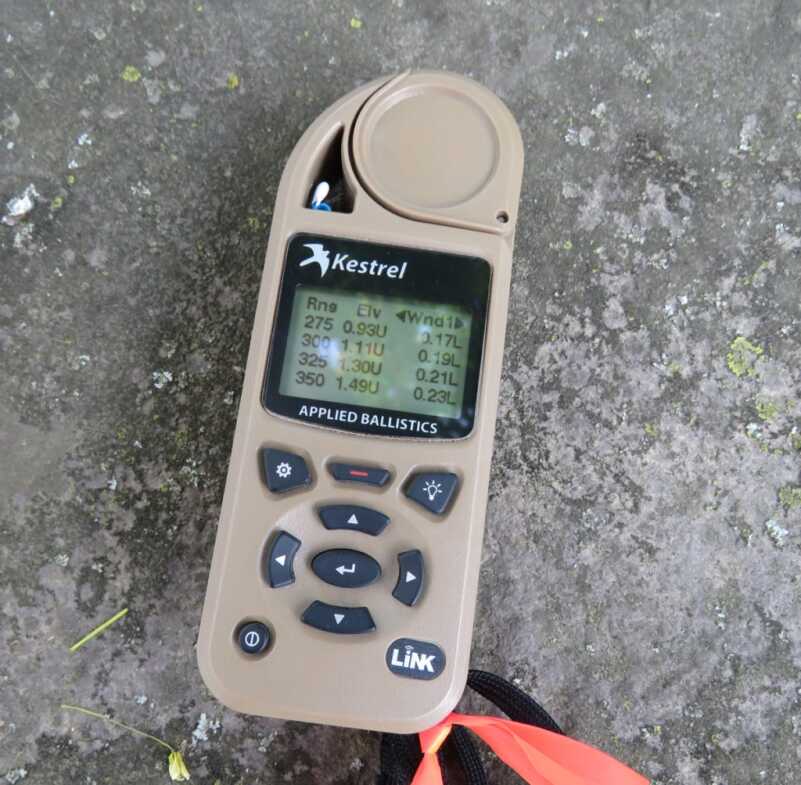
The Range Card feature is very handy when you need down and dirty dope to take a shot and while the left always displays the range and elevation you can set the right column to display either distance, wind, leads for moving targets, remaining energy, remaining velocity, and more. The range can be adjusted to 10, 20, 25, 50, and 100 yard/meter increments.
As the example with my Ruger 10/22 pointed out above, the 5700 Elite can dramatically shorten the process it takes to build credible rifle data in order to get long range hits. Not every ballistic solver is perfect though as you saw and if the data the Applied Ballistics solver gives you doesn’t quite jive with reality there is a way to true it up. If you’d read one of my previous articles about finding and truing your ballistic data then you know that this can sometimes be a tedious process. The Kestrel has a feature where you can go into the gun profile and calibrate the muzzle velocity by telling it how much elevation you used to get a hit, effectively truing your dope in short order. This is ten times faster than logging it in your data book, going back to an online solver, and making adjustments until it all works out. The Kestrel is the 21st century way of doing things and it’s so much better in my opinion.
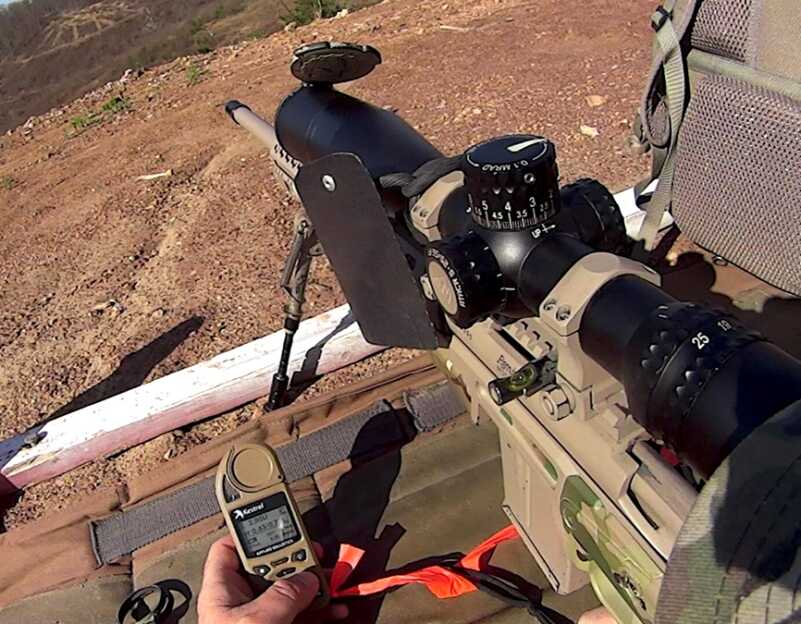
The accuracy of the ballistics engine was phenomenal and during this match I went one for one on the five targets in this stage using nothing but the Kestrel 5700.
Bluetooth Capabilities
The Kestrel Ballistics app is not only is a tool for updating the firmware but it also lets me access ballistic data and gun profiles on my phone. I can easily create, edit, or download a gun profile a little more efficiently using my phone and then download it directly to the unit via Bluetooth. Additionally, if I have the Kestrel set up remotely on a tripod or if someone is holding it, the ballistic data can be streamed in real time to my phone so that it is acting as a heads-up display of sorts. I can look down at my phone and see the wind direction, velocity, elevation, and wind settings without even lifting my head. The app is also useful for backing up your gun profiles in the event something catastrophic should happen you could download them to a new unit without having to suffer through entering all the data a second time. If you have a Kestrel 5700 Elite LiNK it pays to have the app for sure.

The Kestrel Ballistics app allows you to stream live data from the Kestrel to your phone without breaking position. You get live updates with regards to wind speed and direction as well elevation and gun data.
In Conclusion
So is the Kestrel Elite 5700 a databook killer? In a way, I believe so, where data books and data cards were once the primary means of data logging and reference, at best I think they’re going to be viewed as a backup. At worst, they’ll possibly be a relic from days gone by that older shooters will look at and say “Back in my day that’s all we had”. Call it a sign of the instant gratification generation but you have to admit it’s pretty cool that I can get long range hits, almost no matter what caliber I’m shooting, by pressing a few buttons and pointing the Kestrel into the wind. Now, I’m not going to lie, the price for a 5700 Elite w/ LiNK is salty with an MSRP of $699 so I recognize that it may not be for everyone. Considering how often I shoot long range and the number of rifles that I have it makes sense for me and I know that I’m not alone in the corner. The Applied Ballistics solver also gives me the confidence that my dope is going to be accurate no matter what conditions I might find myself in. So for me, confidence is consistency, consistency is accuracy and this Kestrel delivers the goods.
For more information on the Kestrel 5700 Elite w/ LiNK visit: Kestrel Instruments 5700 Elite

The Kestrel Ballistics app allows for the easy creation, upload, and download of gun profiles between your phone and Kestrel via the Bluetooth connection. The Elite 5700 can store up to 30 distinct gun profiles for anything from rimfire cartridges to magnum centerfires. I do recommend that you back up your gun profiles to the app though just incase something should happen to the Kestrel.


Very, very nice tool for the dedicated rifle shooter and though I tend to poo-poo expensive technology as little more than expensive toys I do make elbow room for gadgets that can be used both on the gun range and in practical field use… Thing is, all of you gun cranks out there who hit the range with regularity know full well as to how many other shooters there are with nothing more than the latest AR-platform toy, several lost-leader-bought boxes of cartridges and not much else. A range bag? yeah, right. A range bag with actual range tools? Mercy and heaven\’s sakes, you gotta\’ be kidding me. A spotting scope, shooting bags (much less a Lead Sled)? Never on a month of Sundays. So guys that are into serious shooting I could see this being a useful and worthwhile tool. Just don\’t let that smuck in the next shooting bay whine that he\’d like to borrow it.
In my younger days as a hang glider pilot I used the first kestrels as basically a wind meter, and later they added altitude density and temperature. Not surprising they jumped to the ballistics market. As nice as this unit is, when I look at the price I have to ask myself is it worth it compared to the cheap alternatives I already have?
At the very foundation of all Kestrels is that they are wind meters–so I look at this and ask myself–what has changed since the original in that respect? Surface winds tend to be very dynamic; so if I were looking for a wind meter that “I gotta have” I would be looking for one that could model airmass movement beyond than the one sample shooter’s position.